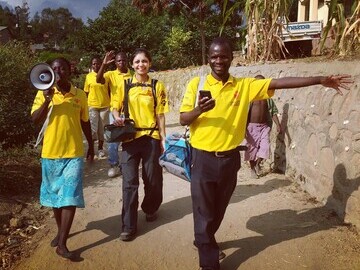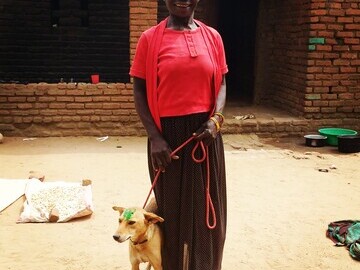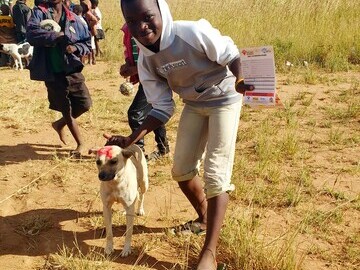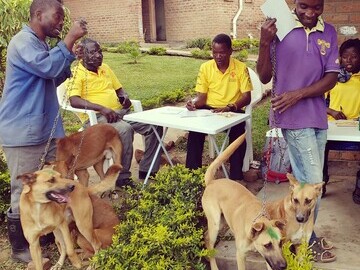Mission Rabies – Saving Human Lives through Dog Vaccination in Malawi
Mission Rabies is a UK-based charity developing practical methods to combat the disease in some of the worst-affected areas. Their recent research pub
The rabies virus continues to cause unimaginable suffering to thousands of people every year, killing an estimated 59,000 across the globe. The virus is spread by the domestic dog, causing once-friendly animals to bite at random, spreading the virus through their saliva. For decades the solution has been clear; vaccinate the dogs and the virus stops – no more aggressive rabid dogs in the streets, no more children facing a death sentence, no more families torn apart. Yet numerous practical challenges in the hardest-hit countries mean that action has stalled and rabies continues its rampage.
Mission Rabies is a UK-based charity developing practical methods to combat the disease in some of the worst-affected areas. Their recent research publication in PLOS Neglected Tropical Diseases reports the approach used to vaccinate 35,000 dogs in Blantyre – a large city in Malawi, southern Africa - demonstrating that the World Health Organization-recommended target of vaccination of at least 70% of the dog population is possible. The one month campaign generated a huge buzz as the teams in yellow t-shirts systematically vaccinated every corner of the city which is home to around one million people. Smartphones were used to direct the teams with military precision on a daily basis from a central headquarters though the innovation of a tailor-made App developed by the charity. The success of the month-long campaign was largely thanks to the willing involvement of the public, who brought dogs in their thousands for free protective vaccine.
The Malawian Department of Animal Health and Livestock Development were instrumental in bringing attention to the problem of rabies in Blantyre and in contributing to the success of the campaign. Government animal health workers provided invaluable expertise in administering the thousands of doses of vaccine and have continued to work with the teams to vaccinate the surrounding rural region. “The Government of Malawi, through the Department of Animal Health & Livestock Development, appreciate the great effort and commitment which Mission Rabies, and its supporting partners, has exerted to assist Malawi in the fight against rabies. Malawi has indeed taken a great leap towards achieving its goal to eliminate rabies in the near foresee able future” spoke Dr Patrick Chikungwa, Deputy Director of the Department.
The project, ultimately aiming to save the lives of people in Blantyre, is funded by Dogs Trust and all vaccine is donated by MSD Animal Health. “None of this would be possible without the dedicated support of Dogs Trust, MSD Animal Health and our international and local partners, Worldwide Veterinary Service, Blantyre SPCA and the Department of Animal Health and Livestock Development” says Dr Luke Gamble, Mission Rabies CEO. “This publication is the culmination of years of work in developing the practical tools needed to implement the action on the ground and we have shown how the lifesaving work recommended by WHO can be put into practice.”
The research paper is the result of collaboration with the Epidemiology team at the Roslin Institute in the University of Edinburgh. Dr Richard Mellanby from Edinburgh University has helped to establish research as a core component of the NGO’s work and commented on the significance of this paper; “There is gathering political will to eliminate rabies, with the WHO aiming to eliminate the virus by 2030, however reports of large scale action implementing what is reported to be needed are still
scarce. This paper shows that initiatives on this scale can be successful and that the process of eliminating the virus from large areas should begin without delay, preventing further deaths. Blantyre is just the beginning and it is important that this work is expanded towards the national elimination of rabies from Malawi”.
The team continue to build on the success of the Blantyre campaign; having already vaccinated a further 15,000 dogs in the surrounding rural regions, they now aim to further expand into the neighbouring districts. Commenting on future plans, Dr Kate Shervell, Mission Rabies International Director said, “During our work in Blantyre there were many cases of rabies being reported from the nearest city, Zomba. In 2016 we are excited to be expanding this work into that city and the surrounding region, which we expect will bring the annual number of vaccines delivered to over 90,000 doses in Southern Malawi.”
Mission Rabies also run campaigns in India where over quarter of a million vaccines have been delivered in the past two years, as well as Tanzania, Uganda and Sri Lanka. Their approach is tailored in each setting to vaccinate as many dogs as possible and the charity continue to share their lessons learnt so that others can join in the fight against rabies.
The published research paper can be accessed here and more information about the Malawi programme, future projects and how to become a part of Mission Rabies can be found on www.missionrabies.com
For more information and/or images, please contact:
Emma Harrison, Marketing Manager, Mission Rabies UK
T: +44 1725 557225 E-mail: emma.harrison@wvs.org.uk
Andy Gibson, Epidemiology and Research Manager, Mission Rabies UK
T: +44 1725 557225 E-mail: andy@missionrabies.com
Press release distributed by Pressat on behalf of Mission Rabies, on Monday 18 July, 2016. For more information subscribe and follow https://pressat.co.uk/
Rabies Animals Dogs Zoonotic Diseases Charity Charities Volunteering Vet Vets Animal Welfare Animals Malawi Africa Charities & non-profits Farming & Animals Health Medical & Pharmaceutical
You just read:
Mission Rabies – Saving Human Lives through Dog Vaccination in Malawi
News from this source:











